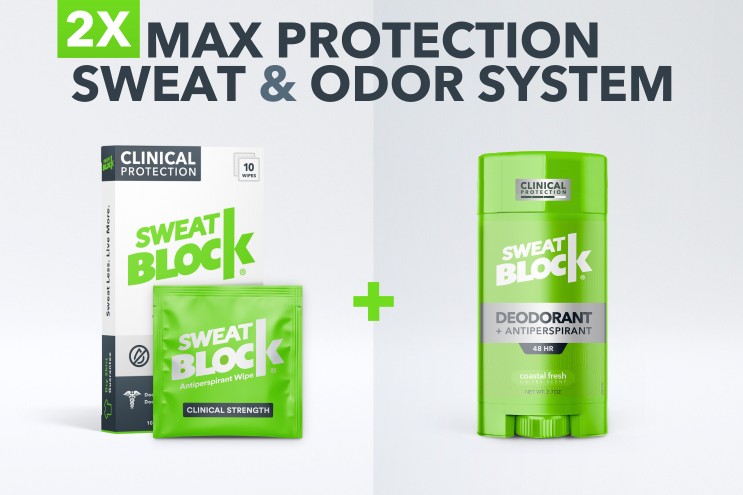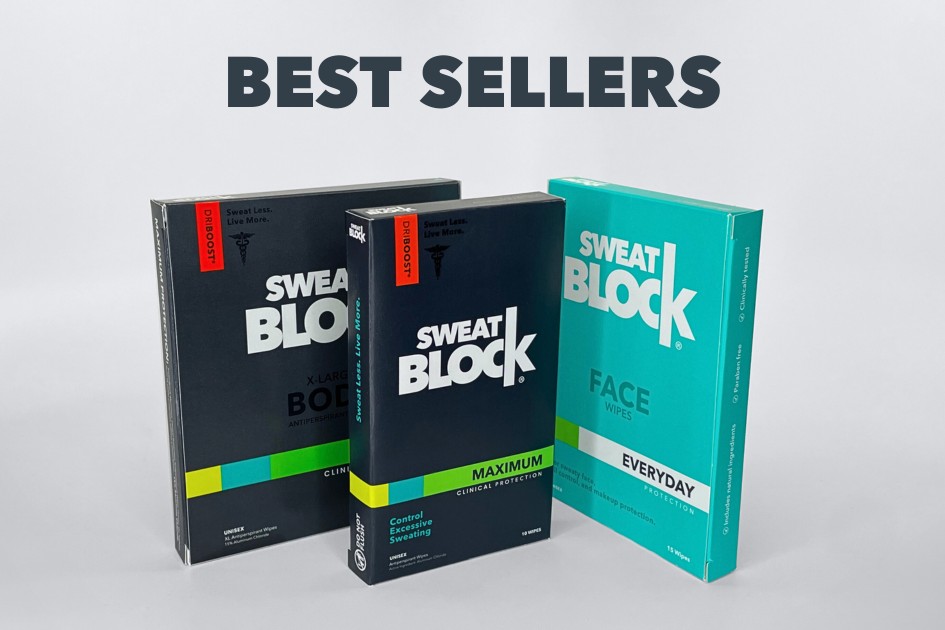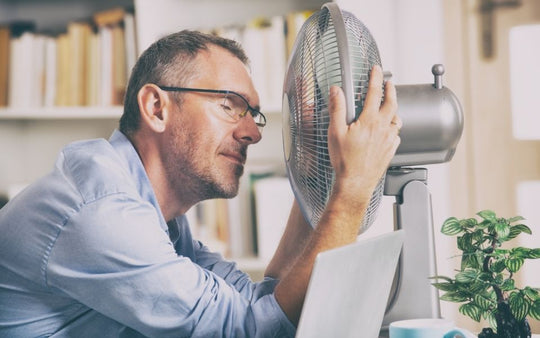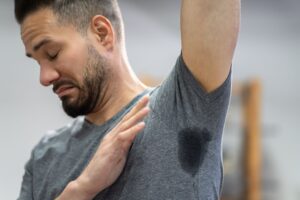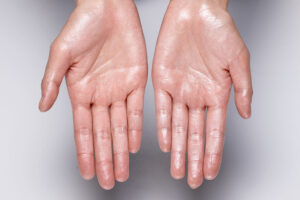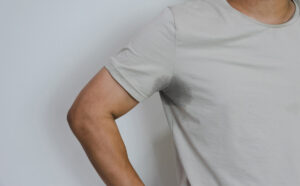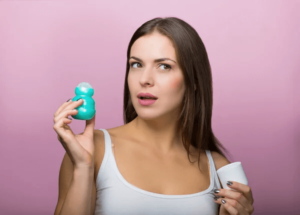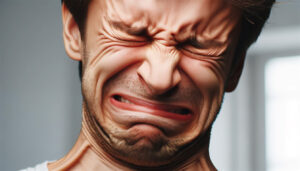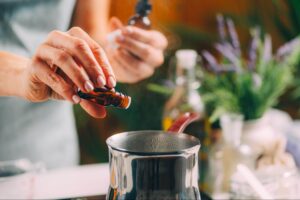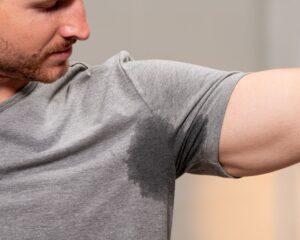Table of Contents
Do you ever feel like you’re the sweatiest person in the room? Is face sweating getting in the way of life? (dictating your wardrobe, your social activities, and even where you sit in a bar or restaurant). You’ve probably asked yourself all these questions: “Why do I sweat so much?”, “Why does my face sweat so much?”, or “How to stop face sweating?”.
The embarrassment and humiliation caused by excessive face sweating are enough to drive one to a life of isolation.
Anxiety, stress, medications, diet, and climate are all possible causes of profuse face sweating.
For some of us, the cause is more mysterious and the sweat is even more extreme.
This type of excessive sweating is called hyperhidrosis. In fact, there are several types of hyperhidrosis.
In this article we’re going to focus on answering your “why does my face sweat so much?” question by focusing on what causes, and what cures, excessive face sweating.
Hyperhidrosis affects an estimated 15 million people in the United States. Roughly 10% of them suffer from excessive forehead and facial sweating. Like you, they want to stop their excessive sweating.
While there isn’t a sure-fire cure for hyperhidrosis, there are tips and treatments that can provide relief from forehead and face sweating.
9 Ways to Stop Face Sweating:
- Handkerchiefs, Bandanas and Cooling towels
- Diet Hacks – Less carbs, sugar and caffeine. More vegetables, vitamins and H20.
- Reduce Stress + Anxiety
- Stop Focusing on the Sweat
- Clinical Strength Antiperspirants
- Prescription Strength Antiperspirants
- Botox Injections
- Iontophoresis
- Medications for Craniofacial Hyperhidrosis
How to Stop Sweating on Face
Let’s take a closer look at each one of these tips and treatments designed to stop excessive face sweating. Some are simple and inexpensive. Some aren’t so simple and will set you back a hefty chunk of change. The seriousness of your condition and what you may have already tried will determine which one(s) you choose.
1. Handkerchiefs, Bandanas or Cooling Towels
If you find yourself wondering, “why does my face sweat so much?“, these hacks for face sweating can provide some minor relief. Carry a clean handkerchief in your back pocket to wipe away excess sweat throughout the day. You can also wear a bandana to soak up extra sweat. While not a viable solution for everyone, it can help. If you live in a hot climate, a cooling towel can be very helpful in bringing down your body temperature and reducing sweat.
2. Diet Hacks to Tame Facial Sweating
Here’s the deal… your health is often a reflection of your diet. If you have a poor diet, things aren’t going to work as well. Before you start taking crazy medications or undergoing life-altering surgeries, take a shot at optimizing your diet for less sweat.
So what can you do?
Here’s a few things you can do to give yourself a fighting chance at beating face sweat:
- More Water: If you’re not getting enough water, your body is going to have a hard time cooling down.
- Less Caffeine: Caffeine promotes the release of adrenaline and puts your body into beast mode “fight or flight”. Your heart rate goes up, blood pressure rises, and for a few hours you feel unstoppable. All the superpowers that come from your favorite energy drink or morning coffee have side effects. Yep… with that gain comes some pain – more sweat.
- Less Alcohol: Alcohol can increase heart rate and dilate the blood vessels. This can increase body temperature and cause more sweating than normal.
- Less Carbs and Junk Food: Many hyperhidrosis sufferers claim that low carb diets and Keto diets can be very effective at treating face sweating and hyperhidrosis.
- More Vegetables: Vegetables do a host of things to make your body work smoother. Aside from promoting balance, veggies can aid in smooth digestion which helps reduce sweating.
- More Vitamins: Vitamins, like Vitamin B, help your body carry out critical metabolic functions and inter-nerve communication that keeps things running smoothly. A smooth running body works less and sweats less.
If you’ve already tried numerous options without much success and you’re still asking, “why does my face sweat so much?”, you’ll also want to avoid spicy foods and hot foods. Spicy foods trick your body into thinking temperatures are rising and you end up sweating more. Hot foods, like coffee or soup, increase core body temperature and promote sweating.
Excessive sweating is also a common side effect of being overweight. By implementing some of the above diet hacks with some regular exercise, you can lose weight and boost your confidence. (both can drastically decrease embarrassing face sweat.)
3. Reduce Stress & Anxiety
A lot of people who suffer from excessive face sweating also suffer from anxiety. In fact, anxiety and emotional stress are one of the most common sweat triggers. It makes sense that reducing the stress in your life can also eliminate the anxiety sweating that comes with it.
4. Stop Focusing on the Sweat
One of the biggest triggers for sweat is thinking about sweat. If you suffer from profuse face sweating, you know what I mean. You walk into a room, you start to think “please don’t sweat, please don’t sweat”, your body kicks into fear/survival mode, you start sweating, you wonder “do they notice my face sweating? I hope they can’t see it”, more sweat follows… and the vicious cycle continues. Eliminate your fear of sweating and its perceived consequences and you can eliminate much of the resulting anxiety sweat.
5. Clinical Strength Antiperspirant
These antiperspirants contain higher concentrations of the active ingredients that stop profuse sweating. One of those ingredients, aluminum chloride, works by plugging sweat glands. SweatBlock is one of these.
SweatBlock is stronger than the antiperspirants you’ll find down the personal care aisle as it contains 14% aluminum chloride. For many people, these enhanced-concentration antiperspirants are the best solution. They are considered the first line of attack to control excessive face sweating. The wipes can be used anywhere on the body, including the forehead and face. You can also find this string antiperspirant available in a stick form. Applications are often repeated every four to seven days as needed.
6. Prescription Strength Antiperspirants
If you’re under a doctor’s care for your sweaty forehead, he/she may prescribe an antiperspirant with a higher concentration of the active sweat preventing ingredient. These are only available by prescription and contain up to 30% aluminum chloride hexahydrate. These antiperspirants are applied on the affected area with special applicator pads or a towelette.
Be careful, these prescription strength antiperspirants can cause serious skin irritations so it’s important to follow the guidelines for use and application exactly as prescribed by your doctor. Both clinical strength and prescription strength hyperhidrosis antiperspirants are formulated primarily for underarm use but they have also proven effective for treating face and forehead sweating.
After undergoing this treatment, you might wonder less, or not at all “why does my face sweat so much?“.
7. Botox Injections (Botulinum Toxin)
Treatment with botulinum toxin (Botox) is a long-term solution for face sweating. It temporarily blocks the chemical that switches on the nerves that cause excessive sweat.
If you and your doctor opt for these injections, your skin will first be anesthetized. Each affected area of your face will receive enough injections to ensure that all the nerves have been treated. The injections are shallow and penetrate just below the surface of the skin.
Botox injections performed on the face and forehead are delicate procedures so you’ll want to find a skillful and experienced practitioner. The procedure is normally not lengthy and can be done in the doctor’s office. The desired effects will last 4 to 12 months, after which the treatments must be repeated. Botox injections have been shown to reduce forehead and facial sweating up to 87%.
While safe and effective, this treatment is painful. Some people experience temporary muscle pain in the treated areas. Botox injections have also proven effective in treating gustatory sweating, also known as Frey’s Syndrome. This condition leads to profuse sweating after eating even mild foods and can even occur when only thinking about eating.
8. Iontophoresis for Facial Hyperhidrosis
Iontophoresis is a treatment that has been used to treat excessive face sweating since the 1940s. It’s usually applied to the hands or feet but recent improvements in its application have made the treatment more effective for craniofacial hyperhidrosis too.
An easy way of understanding this procedure is to think of it as an injection without a needle. It is non-invasive and uses a low-level electric current to drive medications through the skin’s surface with the use of special pads.
The process is usually repeated two or three times a week until the desired results are realized. At this point, recipients are switched to a maintenance schedule of once per week. Iontophoresis devices can be purchased allowing patients to self-medicate at home. The equipment is pricey and probably not covered by your insurance.
9. Nerve Blocking Medications for Hyperhidrosis
These medicines are called anticholinergics and are taken by mouth. Glycopyrrolate is the most commonly used. Its use as a treatment for facial sweating is considered “off-label,” meaning that while it is effective in controlling face sweating, it was formulated to treat other medical conditions.
Anticholinergics work by blocking chemical messengers from reaching the receptors in the sweat glands. There are other similar receptors located in various parts of the body. Because these medicines cannot target only facial or forehead sweat glands, sweating is reduced throughout the entire body.
Reduced sweating everywhere may cause overheating in some situations, so be cautious. Also, side effects such as dry mouth, constipation, blurry vision, difficulty urinating and even heart palpitations can occur. Researchers have recently found a potential dementia link in older patients (65+) using anticholinergics.
Sweaty Face and Forehead Home Remedies
There’s no shortage of do-it-yourself home remedy tips that claim to successfully treat profuse face sweat. Most are astringents used to constrict your eccrine glands and reduce sweating. They can, according to the claims, also balance pH levels.
Among the most popular are drinking apple cider vinegar, sage tea or chamomile tea. Adding some honey to these teas seems to help the medicine go down. Tea tree oil is also an astringent that can be applied to the skin. Essential oils are another way to attack forehead sweat. Suggested essential oil remedies include cypress, lavender, lemon, lime, niaouli, peppermint, petitgrain and pine.
Surgery for Facial and Forehead Sweating
Surgery to remedy excessive sweaty face is not recommended – except as a last resort. The surgery most often used is endoscopic thoracic sympathectomy (ETS). It’s a permanent solution intended for people with hyperhidrosis of the hands but is sometimes used for extreme cases of craniofacial sweating.
The procedure clips nerves from the spinal column that trigger sweat glands in the forehead and face. Serious and unintended consequences can result including excessive compensatory sweating in other parts of the body.
Why Does My Face Sweat So Much?
You already know that sweating is nature’s way of regulating body temperature. Sweating is natural and beneficial… except when it’s not. Normal sweating occurs when we’re overheated or when we’re stressed or nervous. When we sweat much more than is needed to control body heat or when we sweat excessively when we’re nervous, it’s considered primary hyperhidrosis.
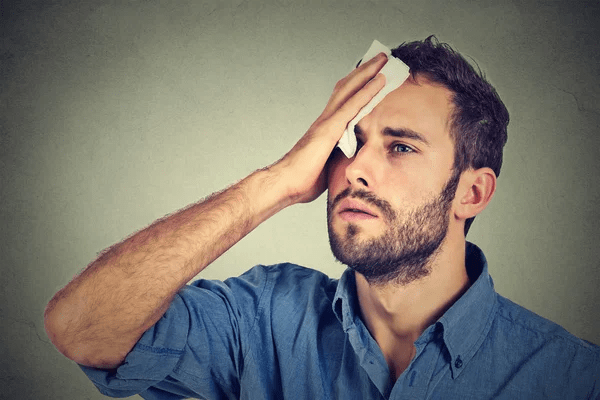
Another cause of excessive face sweating is diaphoresis. It differs from hyperhidrosis in that it is caused by an unrelated medical condition. Menopause, pregnancy, diabetes, thyroid disorders and heart attack are common causes. Diaphoresis usually affects the entire body and not specific locations.
Your face and forehead are covered with a high concentration of eccrine glands. Sympathetic nerves trigger eccrine sweat glands to secrete water directly to the surface of the skin where it cools the body by evaporation. With craniofacial hyperhidrosis, the eccrine glands go crazy.
Excessive sweating of the face and forehead is a physiological condition. It’s thought to be an inherited, genetic trait that affects the sympathetic nervous system. It can also be triggered by stress and anxiety as well as body temperature. But unlike normal sweating, it’s profuse. So profuse and excessive that it’s embarrassing, distressing and it can be debilitating if it negatively affects your quality of life. Those beads of sweat dripping from your head and covering your face like a sheet of heavy rain are more than annoying. They can make you want to take your cold sweaty forehead and retreat into hiding.
Here are six common complications that can occur from excessive face sweating:
Skin Infections
Sufferers from a sweaty forehead and face are more prone to skin infections. Frequently moist skin can promote the growth of bacteria that cause common skin infections. These are particularly prevalent around hair follicles.
Maceration
Maceration is the scientific term for the mushy, wet appearance the skin can take on with profuse and chronic forehead and face sweating.
Stinging Eyes
There’s nothing quite like the sting that hits like a tsunami when waves of face sweat wash over your blinking eyes. Wiping your sweaty brow may not keep up with the deluge. If you’re swimming, working outside in warm weather or trying to drive, stinging sweat in the eyes can be a serious problem.
Acne and Pimples
Excessive sweating by itself does not cause acne or pimples. But, when sweat combines with over-productive oil glands, the glands can become clogged resulting in pimples, or even worse, acne.
Heat Rash
Heat rash occurs when sweat droplets are trapped in blocked pores and cannot get to the surface of the skin to evaporate. The inflammation that results causes a rash. The common symptoms are red bumps popping up on the skin and a prickly or itchy sensation. Getting rid of heat rash is simple in theory, but not easy for people with overly sweaty foreheads – keep the head and face dry.
Social/Emotional
The social and emotional fall-out from your cold sweaty forehead problem can be the worst complication of all. If you’re like most people who suffer from hyperhidrosis, you worry. You worry about how you look. You worry about feeling embarrassed in social situations. You worry about sweat when eating out with friends. You worry at work. You live in fear of speaking in front of coworkers or clients. You worry about your relationships with significant others. Is there any social interaction you don’t worry about?
All these worries stemming from your overactive sweat glands could lead to generalized anxiety disorder (GAD). GAD is rarely the cause of hyperhidrosis but can become a secondary symptom. It messes up your life. You may lose interest in things you love and even lapse into hopelessness.
If you experience any of these symptoms of secondary anxiety caused by hyperhidrosis, it’s vital that you seek treatment as soon as you possibly can.
Summing Up
If you’re reading this article it’s likely because you suffer from facial hyperhidrosis and often wonder “why does my face sweat so much?”. Or you’re close to somebody who does. It’s a real thing, a serious condition. The cause is probably hereditary and there is no known cure, but there are numerous treatments that can reduce or eliminate the symptoms. Life can be livelier. Life can be easier and free from sweaty embarrassment.
The treatments for face sweat vary in complexity and cost. Whether it’s a clinical strength antiperspirant like SweatBlock or a nerve-blocking oral medicine, something is bound to work. Your runaway perspiring can be controlled. There is no reason to suffer in silence or for a moment longer.
You might also like...

Why Do I Sweat So Much? And So Easily?
WHY DO I SWEAT SO MUCH? : ARTICLE CONTENTS Sweating a lot? … when you workout, sleep, after eating, or
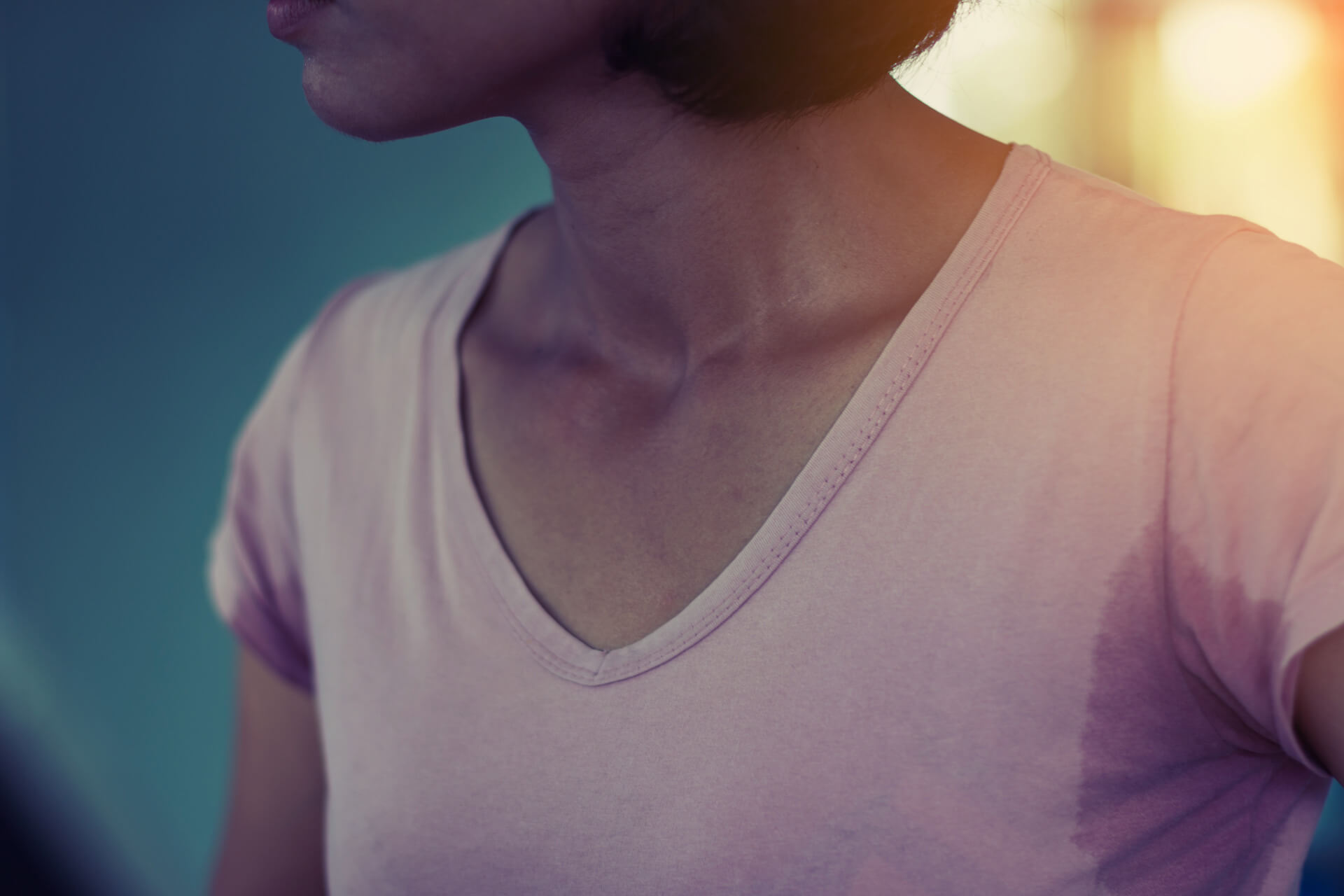
What is Focal Hyperhidrosis? Symptoms, Treatments, & Tips for Managing It Successfully
Table of Contents Does excessive sweating bother you? Keep you from being social? Or make you feel like you can’t

How to Stop Sweating So Much? 9 Tips to Beat Unwanted Sweat
If you’ve ever suffered through an awkward sweaty hug, a slippery handshake, or a sweat-soaked job interview — this article

